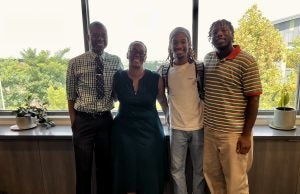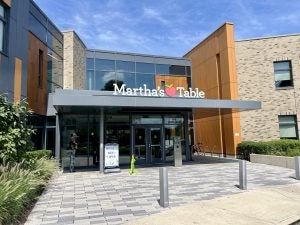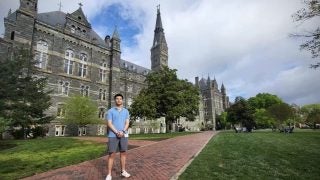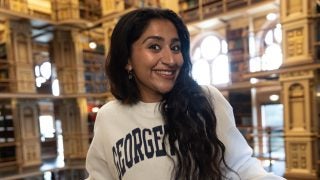Ruth Morgan is a junior in the School of Health studying health care management and policy and minoring in medical humanities.
Upon committing to Georgetown, I was drawn not just to a campus or city, but to a community of people who shared the belief in changing the world. For many, Georgetown’s reputation as a training ground for future lawmakers and politicians naturally conjures an image of change that flows from Capitol Hill. While that path is essential, my vision of change takes root in a different place.
For me, transformation for health and well-being for all happens not only in marble halls, but in waiting rooms, grocery stores, and community centers. Washington, DC, is often praised as a hub for public service, yet beneath that reputation lies a city that grapples with a history that has shaped deep health inequities. As a student at Georgetown’s School of Health, I have had the privilege of stepping outside the classroom and into conversations with community members whose stories remind me that service is not just about policy — it is about people.
This truth is most evident when you look at the landscape of the city itself. The Anacostia River serves as both a physical and metaphorical divide in DC. It separates communities with vastly different levels of access to walkable neighborhoods, fresh food, quality housing, education, and healthcare. Residents east of the river face a life expectancy that is, on average, 15 years shorter than that of Ward 2 — the area that includes Georgetown’s campus.

While there is ample quantitative evidence that highlights the health disparities in DC and informs major policy decisions, there is little qualitative data that captures the insights and lived experiences of those who work in these communities to address these inequities.
This summer, I worked to bridge that gap by working with Brian Floyd, assistant dean of academic affairs at the School of Health and Capitol Applied Learning Labs faculty, as a health innovation research assistant. Alongside Corey Madison (C ’27) and Roberto Terrell (C’27), we drew on our knowledge and experience in our respective majors of American studies, psychology, and healthcare management and policy, and conducted research that centers the voices of community advocates. Under the Georgetown University Urban Innovation Project, the research positions local leaders as sites of knowledge on how institutions like Georgetown can support initiatives throughout the District to improve health disparities that impact many DC residents – particularly those from historically marginalized communities.
As research assistants, we created questions to better understand community leaders’ perspectives on health disparities – where they stem from, the efforts made to address them, and actionable steps that institutions like Georgetown can take to support impactful change. While this community-based assessment aims to identify some of these key issues, we take it a step further by asking how these issues show up most prominently, how communities have remained resilient amidst systemic barriers, and what ways they create intentional engagement within their communities and by students like us.
 Over the summer, we conducted literature reviews to identify the differences between inequities and disparities and where these key issues show up most within the District. We also sat in on oral history interviews conducted by Dean Floyd with community leaders from varying industries, and non-profits like Town Hall Education Arts Recreation Campus (THEARC) and Martha’s Table DC which focuses on supporting children, families, and communities by providing access to quality education, the arts, health and wellness programs, access to healthcare, and economic opportunities to residents. This provided us with the opportunity to observe how a skilled interviewer conducts a session, while we honed our skills, taking notes on details like names, dates, and potential follow-up questions, which can be useful later during the transcription process.
Over the summer, we conducted literature reviews to identify the differences between inequities and disparities and where these key issues show up most within the District. We also sat in on oral history interviews conducted by Dean Floyd with community leaders from varying industries, and non-profits like Town Hall Education Arts Recreation Campus (THEARC) and Martha’s Table DC which focuses on supporting children, families, and communities by providing access to quality education, the arts, health and wellness programs, access to healthcare, and economic opportunities to residents. This provided us with the opportunity to observe how a skilled interviewer conducts a session, while we honed our skills, taking notes on details like names, dates, and potential follow-up questions, which can be useful later during the transcription process.
Our interviews will form the basis for a research publication that we hope will serve as a model for how academic research institutions can best engage with communities for future projects relating to health and urban innovation and how to conduct research that effectively centers the voices of community advocates by applying the principles of Community-Based Participatory Action Research (CBPAR). Our work this summer and throughout this fall semester will shape our presentation at a public event next spring, where we will honor the interviewees for their work in promoting health equity, and (with their permission) donate transcripts of their interviews to the DC History Center’s archive.
What makes this project so meaningful to me encompasses more than just the subject matter, but the approach. We are bringing together public health, psychology, history and community engagement while challenging ourselves to think beyond disciplinary silos to consider the full human context behind the data that we are collecting. Through creating oral history, we are not simply documenting words – we are learning the strengths required and utilized for people to lead, resist and reimagine health equity from the ground up. These interviews not only provide insight – they also provide direction.
Besides, if we want to shape more impactful changes for our future, we should start by listening to the ones who are already building it.



